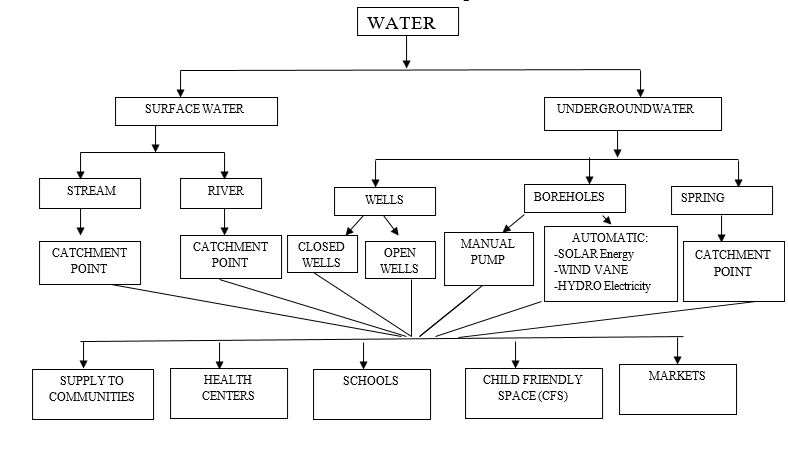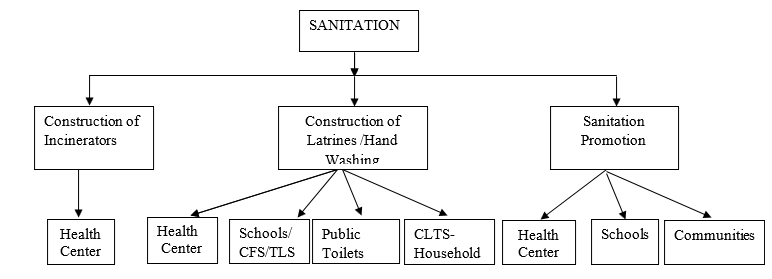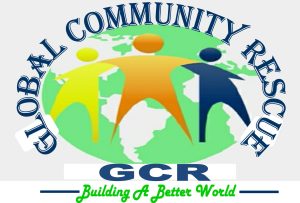Water, Sanitation, and Hygiene (WASH)

GCR aim is to ensure that water reaches everybody in their communities. To ensure access to essential WASH services to the most vulnerable displaced persons, minority groups and affected communities. To prevent and reduce the incident of water- borne diseases outbreak among displaced population and affected communities.
GCR design, construct & rehabilitate (boreholes, wells and water catchment), prepare bill of quantity (BOQ), Monitoring and Evaluation (M&E), water point mapping for boreholes and water supply system of both gravity/spring scheme (Water Catchment) to be provided to “Hard to Reach Communities Areas” in terms of conflict, disaster, disease outbreak and communities to People in Need (PiN) as regards to the criteria of vulnerability to Internally Displaces Persons (IDPs) in bushes/villages/urban/ Peri- Urban, Returnee/Affected Communities, Schools /TLS/CFS and Health Centers and Minimum WASH Kits.
Types of Sources
The following are the common water sources:
- Surface sources (a) Rivers, canals (b) Streams (c) Reservoir and ponds.
- Sub surface sources (a) Infiltration wells (b) Infiltration Galleries, Local Springs.
- Ground water sources (a) Open wells, sanitary wells & bore wells.
SANITATION
These are GCR areas of intervention under Sanitation where there is conflict, disaster, diseases outbreak to affected population, host communities and communities not affected.

Ensure basic safe sanitation access for vulnerable and displaced population with affected communities. Ensure essential sanitation in high risk area and institutions/public places during time of WASH-related diseases, outbreak to IDPs in the Bushes/Villages/Urban/Peri-Urban, Health Center, Returnees, affected communities, schools/TLS/CFS and Hand-Washing facility, Safe preparation of food with promotion of sanitation. Training of Community-Led Total Sanitation (CLTS) and IDPs on how to treat and reuse squatting slabs when full.
HYGIENE
These are the areas of intervention of GCR under Hygiene where there is conflict, disaster, diseases outbreak to affected communities/host communities and communities.

Trained community WASH committee (CWC) members for continuous sensitisation on Social behaviour change (SBC) i.e. regular handwashing with soap and running water to reduce cholera. We educate on personal hygiene practices to the communities and affected communities / host communities to both sex and ages, with more emphasis laid on girls and women on how to use Dignity kits especially sanitary pad and cleaning of their body and disposal of it.
As regard the criteria of vulnerability, we assist affected communities and host communities with Non-Food Items (NFIs) such as: WASH/Hygiene Kits.
We educate the affected communities and host communities, health centers, schools, Child Friendly Space (CFS), TLS, Communities school, the practice of Hand Washing with Soap after visiting the toilet before eating, cooking food, breast feeding babies, feeding of children and brushing of teeth in the morning and how to preserve cook food, etc.
Educate the affected communities and the host Communities on how to treat their household water with the use of AQUATABS in order to have Safe Drinking Water, to reduce Acute Watery Diarrhea (AWD), cholera. Use ORS as a first aid treatment of Acute Watery Diarrhea (AWD) before going to the nearby health center.
Hygiene promotion is by capacity building to the communities, Health Centers, Schools on how to Foster Good Hygiene Practices (FGHP). Cross cutting sectors.
- WATER ACTIVITIES;
- Do surveying of water trend for construction of open wells or close wells and Borehole wells
- Do surveying for quality spring water catchment construction
- Do surveying of water mapping existence and to be constructed within communities
- Borehole Well/Hand pump Construction and Motorized system
- Rehabilitation of Boreholes/Wells
- Rehabilitation /Maintenance of Motorized Water Systems,
- Construction/ Protection of spring water,
- Borehole Well/ Submersible pump rehabilitation/Maintenance,
- Monitoring & Evaluation
- Spring protection rehabilitation/Maintenance
- Water distribution System Expansion,
- Water distribution System rehabilitation/Maintenance
- Distribution of WASH Kits,
- Training of water user Committees and pump mechanics.
- SANITATION ACTIVITIES;
- Construction of Improved Latrines, to Schools, Health Centers, CFSs, Affected Communities/Host Communities
- Installation of Hand Washing facilities
- Distribution of Soap to Schools, Health Centers, CFSs, Affected Communities
- HYGIENE ACTIVITIES;
- Mass Mobilization ( Using TV, Radio, AVV, Social Media, IEC, SMS, Traditional Media,
- Community Clean-up campaign,
- Sanitation and Hygiene promotions (Community Sensitization).
